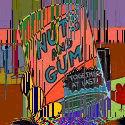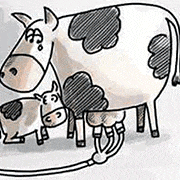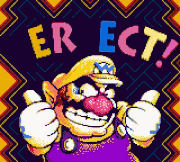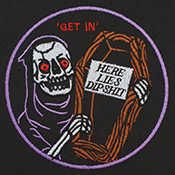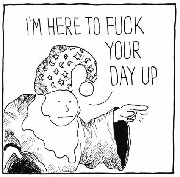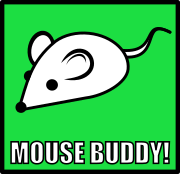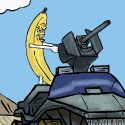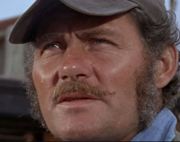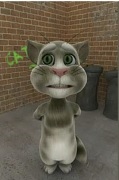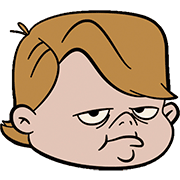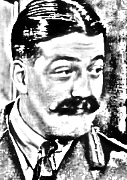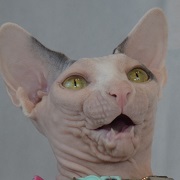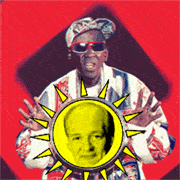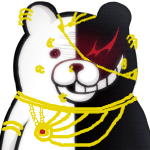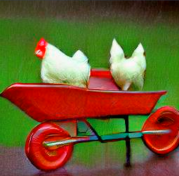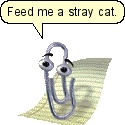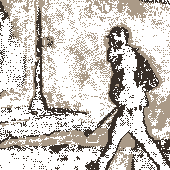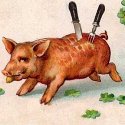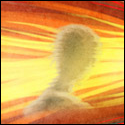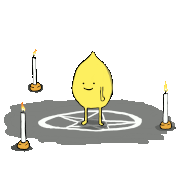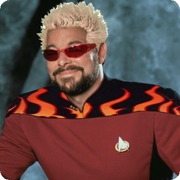|

|
|
|
|

|
| # ? May 15, 2024 05:39 |
|

|
|
|
|
LifeSunDeath posted:me and my son are very sick Whose son was it that was very sick, originally?
|
|
|
|
I think it was a dog?
|
|
|
|
https://twitter.com/BAKKOOONN/status/421370207693594624?s=20&t=J68c3El5n4Gzjgg5wAfiWg
|
|
|
|
 
|
|
|
|

|
|
|
|
i knew german was the language of clowns. english is just a clown dialect of morons.
|
|
|
|
Cumputer
|
|
|
|

|
|
|
|
Lmao, it's Eloise Cole. Who is dead.
|
|
|
|
*highway to hell starts blaring*
|
|
|
|
The poo poo-eating grin strongly implies this is intentional, lol
|
|
|
|
Paladinus posted:Lmao, it's Eloise Cole. Who is dead. Is that the terrifying death-clown from one of the RLM garbage VHS-tapes?
|
|
|
|
Catpain Slack posted:Is that the terrifying death-clown from one of the RLM garbage VHS-tapes? https://www.youtube.com/watch?v=fogrOZESI3o
|
|
|
|
holy poo poo is that eloise cole https://i.imgur.com/nfIN4lk.mp4 edit: it is and this has been covered
|
|
|
|
At least I'm not the only weird one who recognizes a random grief clown, I guess.
|
|
|
|
BaronVonVaderham posted:At least I'm not the only weird one who recognizes a random grief clown, I guess. I mean I couldn't even finish scrolling down this one page before hollering at my screen about it, the woman leaves a distinct impression that's hard to shake
|
|
|
|
I thought it was a photo of l'Academie Française in session
|
|
|
|
DoombatINC posted:I mean I couldn't even finish scrolling down this one page before hollering at my screen about it, the woman leaves a distinct impression that's hard to shake It's not every day you discover that in the 1980s someone dressed up as a clown to go "YOUR MOM DIED!" *honk honk* But, like, in a somber tone.
|
|
|
|
Who is Eloise Cole?
|
|
|
|
Hollismason posted:Who is Eloise Cole? a real bozo
|
|
|
|
Hollismason posted:Who is Eloise Cole? She's a clown that made a (badly produced) video about helping children with grief and then the video was featured on bad movie/video youtube channel Red Letter Media.
|
|
|
|
fukn legend
|
|
|
|
muscles like this! posted:She's a clown that made a (badly produced) video about helping children with grief and then the video was featured on bad movie/video youtube channel Red Letter Media. Oh I don't pay attention to Red Letter Media, I don't think they're funny.
|
|
|
|
For twelve years, you have been asking: Who is Eloise Cole? This is Eloise Cole speaking. I am the clown who loves his life. I am the clown who does not sacrifice his love or his values. I am the clown who has deprived you of victims and thus has destroyed your world, and if you wish to know why you are perishing—you who dread knowledge—I am the man who will now tell you.” The chief engineer was the only one able to move; he ran to a television set and struggled frantically with its dials. But the screen remained empty; the speaker had not chosen to be seen. Only his voice filled the airways of the country—of the world, thought the chief engineer—sounding as if he were speaking here, in this room, not to a group, but to one man; it was not the tone of addressing a meeting, but the tone of addressing a mind. “You have heard it said that this is an age of moral crisis. You have said it yourself, half in fear, half in hope that the words had no meaning. You have cried that man’s sins are destroying the world and you have cursed human nature for its unwillingness to practice the virtues you demanded. Since virtue, to you, consists of sacrifice, you have demanded more sacrifices at every successive disaster. In the name of a return to morality, you have sacrificed all those evils which you held as the cause of your plight. You have sacrificed justice to mercy. You have sacrificed independence to unity. You have sacrificed reason to faith. You have sacrificed wealth to need. You have sacrificed self-esteem to self-denial. You have sacrificed happiness to duty. “You have destroyed all that which you held to be evil and achieved all that which you held to be good. Why, then, do you shrink in horror from the sight of the world around you? That world is not the product of your sins, it is the product and the image of your virtues. It is your moral ideal brought into reality in its full and final perfection. You have fought for it, you have dreamed of it, and you have wished it, and I—I am the man who has granted you your wish. “Your ideal had an implacable enemy, which your code of morality was designed to destroy. I have withdrawn that enemy. I have taken it out of your way and out of your reach. I have removed the source of all those evils you were sacrificing one by one. I have ended your battle. I have stopped your motor. I have deprived your world of man’s mind. “Clowns do not live by the mind, you say? I have withdrawn those who do. The mind is impotent, you say? I have withdrawn those whose mind isn’t. There are values higher than the mind, you say? I have withdrawn those for whom there aren’t. “While you were dragging to your sacrificial altars the men of justice, of independence, of reason, of wealth, of self-esteem—I beat you to it, I reached them first. I told them the nature of the game you were playing and the nature of that moral code of yours, which they had been too innocently generous to grasp. I showed them the way to live by another morality—mine. It is mine that they chose to follow. “All the men who have vanished, the men you hated, yet dreaded to lose, it is I who have taken them away from you. Do not attempt to find us. We do not choose to be found. Do not cry that it is our duty to serve you. We do not recognize such duty. Do not cry that you need us. We do not consider need a claim. Do not cry that you own us. You don’t. Do not beg us to return. We are on strike, we, the men of the mind. “We are on strike against self-immolation. We are on strike against the creed of unearned rewards and unrewarded duties. We are on strike against the dogma that the pursuit of one’s happiness is evil. We are on strike against the doctrine that life is guilt. “There is a difference between our strike and all those you’ve practiced for centuries: our strike consists, not of making demands, but of granting them. We are evil, according to your morality. We have chosen not to harm you any longer. We are useless, according to your economics. We have chosen not to exploit you any longer. We are dangerous and to be shackled, according to your politics. We have chosen not to endanger you, nor to wear the shackles any longer. We are only an illusion, according to your philosophy. We have chosen not to blind you any longer and have left you free to face reality—the reality you wanted, the world as you see it now, a world without mind. “We have granted you everything you demanded of us, we who had always been the givers, but have only now understood it. We have no demands to present to you, no terms to bargain about, no compromise to reach. You have nothing to offer us. We do not need you. “Are you now crying: No, this was not what you wanted? A mindless world of ruins was not your goal? You did not want us to leave you? You moral cannibals, I know that you’ve always known what it was that you wanted. But your game is up, because now we know it, too. “Through centuries of scourges and disasters, brought about by your code of morality, you have cried that your code had been broken, that the scourges were punishment for breaking it, that men were too weak and too selfish to spill all the blood it required. You damned man, you damned existence, you damned this earth, but never dared to question your code. Your victims took the blame and struggled on, with your curses as reward for their martyrdom—while you went on crying that your code was noble, but human nature was not good enough to practice it. And no one rose to ask the question: Good?—by what standard? “You wanted to know Eloise Cole's identity. I am the man who has asked that question. “Yes, this is an age of moral crisis. Yes, you are bearing punishment for your evil. But it is not man who is now on trial and it is not human nature that will take the blame. It is your moral code that’s through, this time. Your moral code has reached its climax, the blind alley at the end of its course. And if you wish to go on living, what you now need is not to return to morality—you who have never known any—but to discover it. “You have heard no concepts of morality but the mystical or the social. You have been taught that morality is a code of behavior imposed on you by whim, the whim of a supernatural power or the whim of society, to serve God’s purpose or your neighbor’s welfare, to please an authority beyond the grave or else next door—but not to serve your life or pleasure. Your pleasure, you have been taught, is to be found in immorality, your interests would best be served by evil, and any moral code must be designed not for you, but against you, not to further your life, but to drain it. “Both sides agreed that morality demands the surrender of your self-interest and of your mind, that the moral and the practical are opposites, that morality is not the province of reason, but the province of faith and force. Both sides agreed that no rational morality is possible, that there is no right or wrong in reason—that in reason there’s no reason to be moral. “Whatever else they fought about, it was against man’s mind that all your moralists have stood united. It was man’s mind that all their schemes and systems were intended to despoil and destroy. Now choose to perish or to learn that the anti-mind is the anti-life. “Man’s mind is his basic tool of survival. Life is given to him, survival is not. His body is given to him, its sustenance is not. His mind is given to him, its content is not. To remain alive, he must act, and before he can act he must know the nature and purpose of his action. He cannot obtain his food without a knowledge of food and of the way to obtain it. He cannot dig a ditch-or build a cyclotron—without a knowledge of his aim and of the means to achieve it. To remain alive, he must think. “But to think is an act of choice. The key to what you so recklessly call ‘human nature,’ the open secret you live with, yet dread to name, is the fact that man is a being of volitional consciousness. Reason does not work automatically; thinking is not a mechanical process; the connections of logic are not made by instinct. The function of your stomach, lungs or heart is automatic; the function of your mind is not. In any hour and issue of your life, you are free to think or to evade that effort. But you are not free to escape from your nature, from the fact that reason is your means of survival—so that for you, who are a human being, the question ‘to be or not to be’ is the question ‘to’ think or not to think.’ “A being of volitional consciousness has no automatic course of behavior. He needs a code of values to guide his actions. ‘Value’ is that which one acts to gain and keep, ‘virtue’ is the action by which one gains and keeps it. ‘Value’ presupposes an answer to the question: of value to whom and for what? ‘Value’ presupposes a standard, a purpose and the necessity of action in the face of an alternative. Where there are no alternatives, no values are possible. “There is only one fundamental alternative in the universe: existence or non-existence—and it pertains to a single class of entities: to living organisms. The existence of inanimate matter is unconditional, the existence of life is not; it depends on a specific course of action. Matter is indestructible, it changes its forms, but it cannot cease to exist. It is only a living organism that faces a constant alternative: the issue of life or death. Life is a process of self-sustaining and-self-generated action. If an organism fails in that action, it does; its chemical elements remain, but its life goes out of existence. It is only the concept of ‘Life’ that makes the concept of ‘Value’ possible. It is only to a living entity that things can be good or evil. “A plant must feed itself in order to live; the sunlight, the water, the chemicals it needs are the values its nature has set it to pursue; its life is the standard of value directing its actions. But a plant has no choice of action; there are alternatives in the conditions it encounters, but there is no alternative in its function: it acts automatically to further its life, it cannot act for its own destruction. “An animal is equipped for sustaining its life; its senses provide it with an automatic code of action, an automatic knowledge of what is good for it or evil. It has no power to extend its knowledge or to evade it. In conditions where its knowledge proves inadequate, it dies. But so long as it lives, it acts on its knowledge, with automatic safety and no power of choice, it is unable to ignore its own good, unable to decide to choose the evil and act as its own destroyer. We stand for active ideological struggle because it is the weapon for ensuring unity within the Party and the revolutionary organizations in the interest of our fight. Every Communist and revolutionary should take up this weapon. But liberalism rejects ideological struggle and stands for unprincipled peace, thus giving rise to a decadent, Philistine attitude and bringing about political degeneration in certain units and individuals in the Party and the revolutionary organizations. Liberalism manifests itself in various ways. To let things slide for the sake of peace and friendship when a person has clearly gone wrong, and refrain from principled argument because he is an old acquaintance, a fellow townsman, a schoolmate, a close friend, a loved one, an old colleague or old subordinate. Or to touch on the matter lightly instead of going into it thoroughly, so as to keep on good terms. The result is that both the organization and the individual are harmed. This is one type of liberalism. To indulge in irresponsible criticism in private instead of actively putting forward one's suggestions to the organization. To say nothing to people to their faces but to gossip behind their backs, or to say nothing at a meeting but to gossip afterwards. To show no regard at all for the principles of collective life but to follow one's own inclination. This is a second type. To let things drift if they do not affect one personally; to say as little as possible while knowing perfectly well what is wrong, to be worldly wise and play safe and seek only to avoid blame. This is a third type. Not to obey orders but to give pride of place to one's own opinions. To demand special consideration from the organization but to reject its discipline. This is a fourth type. To indulge in personal attacks, pick quarrels, vent personal spite or seek revenge instead of entering into an argument and struggling against incorrect views for the sake of unity or progress or getting the work done properly. This is a fifth type. To hear incorrect views without rebutting them and even to hear counter-revolutionary remarks without reporting them, but instead to take them calmly as if nothing had happened. This is a sixth type. To be among the masses and fail to conduct propaganda and agitation or speak at meetings or conduct investigations and inquiries among them, and instead to be indifferent to them and show no concern for their well-being, forgetting that one is a Communist and behaving as if one were an ordinary non-Communist. This is a seventh type. To see someone harming the interests of the masses and yet not feel indignant, or dissuade or stop him or reason with him, but to allow him to continue. This is an eighth type. To work half-heartedly without a definite plan or direction; to work perfunctorily and muddle along--"So long as one remains a monk, one goes on tolling the bell." This is a ninth type. To regard oneself as having rendered great service to the revolution, to pride oneself on being a veteran, to disdain minor assignments while being quite unequal to major tasks, to be slipshod in work and slack in study. This is a tenth type. To be aware of one's own mistakes and yet make no attempt to correct them, taking a liberal attitude towards oneself. This is an eleventh type. We could name more. But these eleven are the principal types. They are all manifestations of liberalism. Liberalism is extremely harmful in a revolutionary collective. It is a corrosive which eats away unity, undermines cohesion, causes apathy and creates dissension. It robs the revolutionary ranks of compact organization and strict discipline, prevents policies from being carried through and alienates the Party organizations from the masses which the Party leads. It is an extremely bad tendency. Liberalism stems from petty-bourgeois selfishness, it places personal interests first and the interests of the revolution second, and this gives rise to ideological, political and organizational liberalism. People who are liberals look upon the principles of Marxism as abstract dogma. They approve of Marxism, but are not prepared to practice it or to practice it in full; they are not prepared to replace their liberalism by Marxism. These people have their Marxism, but they have their liberalism as well--they talk Marxism but practice liberalism; they apply Marxism to others but liberalism to themselves. They keep both kinds of goods in stock and find a use for each. This is how the minds of certain people work. Liberalism is a manifestation of opportunism and conflicts fundamentally with Marxism. It is negative and objectively has the effect of helping the enemy; that is why the enemy welcomes its preservation in our midst. Such being its nature, there should be no place for it in the ranks of the revolution. We must use Marxism, which is positive in spirit, to overcome liberalism, which is negative. A Communist should have largeness of mind and he should be staunch and active, looking upon the interests of the revolution as his very life and subordinating his personal interests to those of the revolution; always and everywhere he should adhere to principle and wage a tireless struggle against all incorrect ideas and actions, so as to consolidate the collective life of the Party and strengthen the ties between the Party and the masses; he should be more concerned about the Party and the masses than about any private person, and more concerned about others than about himself. Only thus can he be considered a Communist. All loyal, honest, active and upright Communists must unite to oppose the liberal tendencies shown by certain people among us, and set them on the right path. This is one of the tasks on our ideological front. “You have heard it said that this is an age of moral crisis. You have said it yourself, half in fear, half in hope that the words had no meaning. You have cried that man’s sins are destroying the world and you have cursed human nature for its unwillingness to practice the virtues you demanded. Since virtue, to you, consists of sacrifice, you have demanded more sacrifices at every successive disaster. In the name of a return to morality, you have sacrificed all those evils which you held as the cause of your plight. You have sacrificed justice to mercy. You have sacrificed independence to unity. You have sacrificed reason to faith. You have sacrificed wealth to need. You have sacrificed self-esteem to self-denial. You have sacrificed happiness to duty. “You have destroyed all that which you held to be evil and achieved all that which you held to be good. Why, then, do you shrink in horror from the sight of the world around you? That world is not the product of your sins, it is the product and the image of your virtues. It is your moral ideal brought into reality in its full and final perfection. You have fought for it, you have dreamed of it, and you have wished it, and I—I am the man who has granted you your wish. “Your ideal had an implacable enemy, which your code of morality was designed to destroy. I have withdrawn that enemy. I have taken it out of your way and out of your reach. I have removed the source of all those evils you were sacrificing one by one. I have ended your battle. I have stopped your motor. I have deprived your world of man’s mind. “Men do not live by the mind, you say? I have withdrawn those who do. The mind is impotent, you say? I have withdrawn those whose mind isn’t. There are values higher than the mind, you say? I have withdrawn those for whom there aren’t. “While you were dragging to your sacrificial altars the men of justice, of independence, of reason, of wealth, of self-esteem—I beat you to it, I reached them first. I told them the nature of the game you were playing and the nature of that moral code of yours, which they had been too innocently generous to grasp. I showed them the way to live by another morality—mine. It is mine that they chose to follow. “All the men who have vanished, the men you hated, yet dreaded to lose, it is I who have taken them away from you. Do not attempt to find us. We do not choose to be found. Do not cry that it is our duty to serve you. We do not recognize such duty. Do not cry that you need us. We do not consider need a claim. Do not cry that you own us. You don’t. Do not beg us to return. We are on strike, we, the men of the mind. “We are on strike against self-immolation. We are on strike against the creed of unearned rewards and unrewarded duties. We are on strike against the dogma that the pursuit of one’s happiness is evil. We are on strike against the doctrine that life is guilt. “There is a difference between our strike and all those you’ve practiced for centuries: our strike consists, not of making demands, but of granting them. We are evil, according to your morality. We have chosen not to harm you any longer. We are useless, according to your economics. We have chosen not to exploit you any longer. We are dangerous and to be shackled, according to your politics. We have chosen not to endanger you, nor to wear the shackles any longer. We are only an illusion, according to your philosophy. We have chosen not to blind you any longer and have left you free to face reality—the reality you wanted, the world as you see it now, a world without mind. “We have granted you everything you demanded of us, we who had always been the givers, but have only now understood it. We have no demands to present to you, no terms to bargain about, no compromise to reach. You have nothing to offer us. We do not need you. “Are you now crying: No, this was not what you wanted? A mindless world of ruins was not your goal? You did not want us to leave you? You moral cannibals, I know that you’ve always known what it was that you wanted. But your game is up, because now we know it, too. “Through centuries of scourges and disasters, brought about by your code of morality, you have cried that your code had been broken, that the scourges were punishment for breaking it, that men were too weak and too selfish to spill all the blood it required. You damned man, you damned existence, you damned this earth, but never dared to question your code. Your victims took the blame and struggled on, with your curses as reward for their martyrdom—while you went on crying that your code was noble, but human nature was not good enough to practice it. And no one rose to ask the question: Good?—by what standard? “You wanted to know John Galt’s identity. I am the man who has asked that question. “Yes, this is an age of moral crisis. Yes, you are bearing punishment for your evil. But it is not man who is now on trial and it is not human nature that will take the blame. It is your moral code that’s through, this time. Your moral code has reached its climax, the blind alley at the end of its course. And if you wish to go on living, what you now need is not to return to morality—you who have never known any—but to discover it. “You have heard no concepts of morality but the mystical or the social. You have been taught that morality is a code of behavior imposed on you by whim, the whim of a supernatural power or the whim of society, to serve God’s purpose or your neighbor’s welfare, to please an authority beyond the grave or else next door—but not to serve your life or pleasure. Your pleasure, you have been taught, is to be found in immorality, your interests would best be served by evil, and any moral code must be designed not for you, but against you, not to further your life, but to drain it. “For centuries, the battle of morality was fought between those who claimed that your life belongs to God and those who claimed that it belongs to your neighbors—between those who preached that the good is self-sacrifice for the sake of ghosts in heaven and those who preached that the good is self-sacrifice for the sake of incompetents on earth. And no one came to say that your life belongs to you and that the good is to live it. “Both sides agreed that morality demands the surrender of your self-interest and of your mind, that the moral and the practical are opposites, that morality is not the province of reason, but the province of faith and force. Both sides agreed that no rational morality is possible, that there is no right or wrong in reason—that in reason there’s no reason to be moral. “Whatever else they fought about, it was against man’s mind that all your moralists have stood united. It was man’s mind that all their schemes and systems were intended to despoil and destroy. Now choose to perish or to learn that the anti-mind is the anti-life. “Man’s mind is his basic tool of survival. Life is given to him, survival is not. His body is given to him, its sustenance is not. His mind is given to him, its content is not. To remain alive, he must act, and before he can act he must know the nature and purpose of his action. He cannot obtain his food without a knowledge of food and of the way to obtain it. He cannot dig a ditch-or build a cyclotron—without a knowledge of his aim and of the means to achieve it. To remain alive, he must think. “But to think is an act of choice. The key to what you so recklessly call ‘human nature,’ the open secret you live with, yet dread to name, is the fact that man is a being of volitional consciousness. Reason does not work automatically; thinking is not a mechanical process; the connections of logic are not made by instinct. The function of your stomach, lungs or heart is automatic; the function of your mind is not. In any hour and issue of your life, you are free to think or to evade that effort. But you are not free to escape from your nature, from the fact that reason is your means of survival—so that for you, who are a human being, the question ‘to be or not to be’ is the question ‘to’ think or not to think.’ “A being of volitional consciousness has no automatic course of behavior. He needs a code of values to guide his actions. ‘Value’ is that which one acts to gain and keep, ‘virtue’ is the action by which one gains and keeps it. ‘Value’ presupposes an answer to the question: of value to whom and for what? ‘Value’ presupposes a standard, a purpose and the necessity of action in the face of an alternative. Where there are no alternatives, no values are possible. “There is only one fundamental alternative in the universe: existence or non-existence—and it pertains to a single class of entities: to living organisms. The existence of inanimate matter is unconditional, the existence of life is not; it depends on a specific course of action. Matter is indestructible, it changes its forms, but it cannot cease to exist. It is only a living organism that faces a constant alternative: the issue of life or death. Life is a process of self-sustaining and-self-generated action. If an organism fails in that action, it does; its chemical elements remain, but its life goes out of existence. It is only the concept of ‘Life’ that makes the concept of ‘Value’ possible. It is only to a living entity that things can be good or evil. “A plant must feed itself in order to live; the sunlight, the water, the chemicals it needs are the values its nature has set it to pursue; its life is the standard of value directing its actions. But a plant has no choice of action; there are alternatives in the conditions it encounters, but there is no alternative in its function: it acts automatically to further its life, it cannot act for its own destruction. “An animal is equipped for sustaining its life; its senses provide it with an automatic code of action, an automatic knowledge of what is good for it or evil. It has no power to extend its knowledge or to evade it. In conditions where its knowledge proves inadequate, it dies. But so long as it lives, it acts on its knowledge, with automatic safety and no power of choice, it is unable to ignore its own good, unable to decide to choose the evil and act as its own destroyer. “Man has no automatic code of survival. His particular distinction from all other living species is the necessity to act in the face of alternatives by means of volitional choice. He has no automatic knowledge of what is good for him or evil, what values his life depends on, what course of action it requires. Are you prattling about an instinct of self-preservation? An instinct of self-preservation is precisely what man does not possess. An ‘instinct’ is an unerring and automatic form of knowledge. A desire is not an instinct. A desire to live does not give you the knowledge required for living. And even man’s desire to live is not automatic: your secret evil today is that that is the desire you do not hold. Your fear of death is not a love of life and will not give you the knowledge needed to keep it. Man must obtain his knowledge and choose his actions by a process of thinking, which nature will not force him t9 perform. Man has the power to act as his own destroyer—and that is the way he has acted through most of his history. “A living entity that regarded its means of survival as evil, would not survive. A plant that struggled to mangle its roots, a bird that fought to break its wings would not remain for long in the existence they affronted. But the history of man has been a struggle to deny and to destroy his mind. “Man has been called a rational being, but rationality is a matter of choice—and the alternative his nature offers him is: rational being or suicidal animal. Man has to be man—by choice; he has to hold his life as a value—by choice: he has to learn to sustain it—by choice; he has to discover the values it requires and practice his virtues—by choice. “A code of values accepted by choice is a code of morality. “Whoever you are, you who are hearing me now, I am speaking to whatever living remnant is left uncorrupted within you, to the remnant of the human, to your mind, and I say: There is a morality of reason, a morality proper to man, and Man’s Life is its standard of value. “All that which is proper to the life of a rational being is the good; all that which destroys it is the evil. “Man’s life, as required by his nature, is not the life of a mindless brute, of a looting thug or a mooching mystic, but the life of a thinking being—not life by means of force or fraud, but life by means of achievement—not survival at any price, since there’s only one price that pays for man’s survival: reason. “Man’s life is the standard of morality, but your own life is its purpose. If existence on earth is your goal, you must choose your actions and values by the standard of that which is proper to man—for the purpose of preserving, fulfilling and enjoying the irreplaceable value which is your life. “Since life requires a specific course of action, any other course will destroy it. A being who does not hold his own life as the motive and goal of his actions, is acting on the motive and standard of death. Such a being is a metaphysical monstrosity, struggling to oppose, negate and contradict the fact of his own existence, running blindly amuck on a trail of destruction, capable of nothing but pain. “Happiness is the successful state of life, pain is an agent of death. Happiness is that state of consciousness which proceeds from the achievement of one’s values. A morality that dares to tell you to find happiness in the renunciation of your happiness—to value the failure of your values—is an insolent negation of morality. A doctrine that gives you, as an ideal, the role of a sacrificial animal seeking slaughter on the altars of others, is giving you death as your standard. By the grace of reality and the nature of life, man—every man—is an end in himself, he exists for his own sake, and the achievement of his own happiness is his highest moral purpose. “But neither life nor happiness can be achieved by the pursuit of irrational whims. Just as man is free to attempt to survive in any random manner, but will perish unless he lives as his nature requires, so he is free to seek his happiness in any mindless fraud, but the torture of frustration is all he will find, unless he seeks the happiness proper to man. The purpose of morality is to teach you, not to suffer and die, but to enjoy yourself and live. “Sweep aside those parasites of subsidized classrooms, who live on the profits of the mind of others and proclaim that man needs no morality, no values, no code of behavior. They, who pose as scientists and claim that man is only an animal, do not grant him inclusion in the law of existence they have granted to the lowest of insects. They recognize that every living species has a way of survival demanded by its nature, they do not claim that a fish can live out of water or that a dog can live without its sense of smell—but man, they claim, the most complex of beings, man can survive in any way whatever, man has no identity, no nature, and there’s no practical reason why he cannot live with his means of survival destroyed, with his mind throttled and placed at the disposal of any orders they might care to issue. “Sweep aside those hatred-eaten mystics, who pose as friends of humanity and preach that the highest virtue man can practice is to hold his own life as of no value. Do they tell you that the purpose of morality is to curb man’s instinct of self-preservation? It is for the purpose of self-preservation that man needs a code of morality. The only man who desires to be moral is the man who desires to live. “No, you do not have to live; it is your basic act of choice; but if you choose to live,. you must live as a man—by the work and the judgment of your mind. “No, you do not have to live as a man; it is an act of moral choice. But you cannot live as anything else—and the alternative is that state of living death which you now see within you and around you, the state of a thing unfit for existence, no longer human and less than animal, a thing that knows nothing but pain and drags itself through its span of years in the agony of unthinking self-destruction. “No, you do not have to think; it is an act of moral choice. But someone had to think to keep you alive; if you choose to default, you default on existence and you pass the deficit to some moral man, expecting him to sacrifice his good for the sake of letting you survive by your evil. “No, you do not have to be a man; but today those who are, are not there any longer. I have removed your means of survival—your victims. “If you wish to know how I have done it and what I told them to make them quit, you are hearing it now. I told them, in essence, the statement I am making tonight. They were men who had lived by my code, but had not known how great a virtue it represented. I made them see it. I brought them, not a re-evaluation, but only an identification of their values.
|
|
|
|
If that isn't properly clown modified.
|
|
|
|
I aint reading all that. Iím happy for u tho Or sorry that happened.
|
|
|
|
Oh. That's who Eloise Cole is
|
|
|
|
FreudianSlippers posted:For twelve years, you have been asking: Who is Eloise Cole? This is Eloise Cole speaking. I am the clown who loves his life. I am the clown who does not sacrifice his love or his values. I am the clown who has deprived you of victims and thus has destroyed your world, and if you wish to know why you are perishing—you who dread knowledge—I am the man who will now tell you.” The chief engineer was the only one able to move; he ran to a television set and struggled frantically with its dials. But the screen remained empty; the speaker had not chosen to be seen. Only his voice filled the airways of the country—of the world, thought the chief engineer—sounding as if he were speaking here, in this room, not to a group, but to one man; it was not the tone of addressing a meeting, but the tone of addressing a mind.
|
|
|
|
But doctor, I AM Eloise Cole!
|
|
|
|
This ticktok is LIES. The audio is clearly an African grey parrot, NOT a cockatoo. This man is lying about absolutely everything.
|
|
|
|
Cuckatoos, and some other large birds, can live as long as humans so if you buy one you're basically buying a familial curse that will torment your descendants for at least one more generation by doing nothing but screeching and making GBS threads.
|
|
|
|
FreudianSlippers posted:words TL;DR Can you give us the 20,000 foot view?
|
|
|
|
FreudianSlippers posted:Cuckoos can live as long as humans so if you buy one you're basically buying a familial curse that will torment your descendants for at least one more generation by doing nothing but screeching and making GBS threads. This also describes people.
|
|
|
|
 "Multifunction" 
|
|
|
|
I'm reminded of a bit of verse from a book my mother used to enjoy when I was young: Roslyn Taylor posted:The only praise that I can find to sing of the computer (Line spacing poorly repeated from my bad and failing memory)
|
|
|
|
graham cracker posted:what do you think a penis fart would sound / smell like You are pretty close at least in my experience. For any nursing students out there, please make sure there is no air in the line before you shove it up someone's uretha.
|
|
|
|
The McFarlands own
|
|
|
|

|
| # ? May 15, 2024 05:39 |
|
Can that long post be the thread title please.
|
|
|




